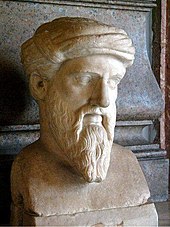The history of mathematics can be seen as an ever-increasing series of abstractions. The first abstraction, which is shared by many animals,was probably that of numbers: the realization that a collection of two apples and a collection of two oranges (for example) have something in common, namely quantity of their members.
As evidenced by tallies found on bone, in addition to recognizing how to count physical objects, prehistoric peoples may have also recognized how to count abstract quantities, like time – days, seasons, years.
Evidence for more complex mathematics does not appear until around 3000 BC, when the Babylonians and Egyptians began using arithmetic, algebra and geometry for taxation and other financial calculations, for building and construction, and for astronomy. The earliest uses of mathematics were in trading, land measurement, painting and weaving patterns and the recording of time.
In Babylonian mathematics, elementary arithmetic (addition, subtraction, multiplication and division) first appears in the archaeological record. Numeracy pre-dated writing and numeral systems have been many and diverse, with the first known written numerals created by Egyptians in Middle Kingdom texts such as the Rhind Mathematical Papyrus.
Between 600 and 300 BC the Ancient Greeks began a systematic study of mathematics in its own right with Greek mathematics.
During the Golden Age of Islam, especially during the 9th and 10th centuries, mathematics saw many important innovations building on Greek mathematics: most of them include the contributions from Persian mathematicians such as Al-Khwarismi, Omar Khayyam and Sharaf al-Dīn al-Ṭūsī.
Mathematics has since been greatly extended, and there has been a fruitful interaction between mathematics and science, to the benefit of both. Mathematical discoveries continue to be made today. According to Mikhail B. Sevryuk, in the January 2006 issue of the Bulletin of the American Mathematical Society, "The number of papers and books included in the Mathematical Reviews database since 1940 (the first year of operation of MR) is now more than 1.9 million, and more than 75 thousand items are added to the database each year. The overwhelming majority of works in this ocean contain new mathematical theorems and their proofs."
Etymology
The word mathematics comes from Ancient Greek μάθημα (máthēma), meaning "that which is learnt","what one gets to know", hence also "study" and "science". The word for "mathematics" came to have the narrower and more technical meaning "mathematical study" even in Classical times.Its adjective is μαθηματικός (mathēmatikós), meaning "related to learning" or "studious", which likewise further came to mean "mathematical". In particular, μαθηματικὴ τέχνη (mathēmatikḗ tékhnē), Latin: ars mathematica, meant "the mathematical art".
Similarly, one of the two main schools of thought in Pythagoreanism was known as the mathēmatikoi (μαθηματικοί)—which at the time meant "teachers" rather than "mathematicians" in the modern sense.
In Latin, and in English until around 1700, the term mathematics more commonly meant "astrology" (or sometimes "astronomy") rather than "mathematics"; the meaning gradually changed to its present one from about 1500 to 1800. This has resulted in several mistranslations. For example, Saint Augustine's warning that Christians should beware of mathematici, meaning astrologers, is sometimes mistranslated as a condemnation of mathematicians.
The apparent plural form in English, like the French plural form les mathématiques (and the less commonly used singular derivative la mathématique), goes back to the Latin neuter plural mathematica (Cicero), based on the Greek plural τα μαθηματικά (ta mathēmatiká), used by Aristotle (384–322 BC), and meaning roughly "all things mathematical"; although it is plausible that English borrowed only the adjective mathematic(al) and formed the noun mathematics anew, after the pattern of physics and metaphysics, which were inherited from Greek.In English, the noun mathematics takes a singular verb. It is often shortened to maths or, in English-speaking North America, math.
REFERENCE FROM WIKIPEDIA



No comments:
Post a Comment